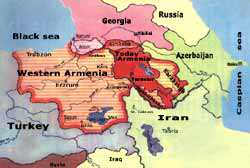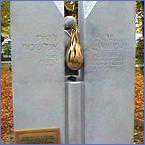While Turkey holds out for concessions over Nagorny- Karabakh, Yerevan remains convinced a restoration of diplomatic ties lies on the horizon.
By Tatul Hakobian in Yerevan (CRS No. 490, 24-Apr-09)
Noyan Soyak, a businessman from Turkey, recalls with a smile that every January 1 he thinks the border with Armenia will open, and almost 12 months later, every December 31, he hopes it will reopen the following year.
“But this year is unique, especially after the visit of Turkish president Abdullah Gul to Yerevan last September,” he said.
“That was a turning point, so we should use this momentum to identify the problems between our two nations and start solving them.”
A businessman with the Istanbul-based chartering and shipping organisation, Alyans, Soyak is also co-vice-chair of the Turkish-Armenian business development council, TABDC.
Established in 1997, TABDC is chaired by representatives from each country; Soyak and his brother Kaan Soyak from Turkey, and Arsen Ghazarian, president of the union of manufacturers and businessmen of Armenia.
“Since 1997 we have been working on a lot of projects, such as cultural events and business meetings,” Soyak continued.
“Our latest project is a documentary movie to be made with the Armenian Marketing Association on the river Araks that separates the two countries.”
The idea is for each country to film its own 30-minute documentary on the river, and later combine them into one film. Each segment will present a separate perspective on a common, shared treasure.
The combined documentary will be translated into English as well as appearing in both Turkish and Armenian, and will help acquaint the inhabitants of both sides with current processes, problems and thoughts, creating links between the countries.
While the Turkish businessman still cannot predict a date when the border between Armenia and Turkey will finally be opened, he is sure it would benefit not only the two countries but the whole region.
For one thing, it would stimulate cultural tourism and create new jobs. As for the commodity turnover between Armenia and Turkey, worth only about 135 million US dollars in 2007, that would soar in a short period.
“The opening of Kars-Gyumri railway would provide a lot of jobs,” Soyak explained. “Turkey, Armenia and Azerbaijan would then form a big market and a transport corridor.”
Armenia is already officially in favour of reopening of the border – provided there are no preconditions on the subject of the disputed Armenian enclave of Nagorny-Karabakh.
But Turkey has until now insisted on concessions over the enclave as the price of reopening the border, which it closed in 1993.
Yerevan continues making optimistic statements on the normalisation of relations, even though Turkish prime minister Recep Tayyip Erdogan repeatedly stated this month that Ankara will not reestablish ties without a resolution of the Nagorny-Karabakh issue.
Recent reports in foreign media, which suggested Armenia and Turkey would sign a protocol to re-establish diplomatic relations in Yerevan on April 16, proved inaccurate.
But less than a week later, on April 22, the Armenian, Turkish and Swiss foreign ministries issued a joint statement that confirmed that Turkey and Armenia, with Switzerland as mediator, had been “working intensively with a view to normalising their bilateral relations”.
It declared the two parties “had agreed on a comprehensive framework” for doing so and “a road map has been identified”.
The surprise development, coming only two days before the annual April 24 anniversary of the Armenian genocide, provoked as much anger as amazement in some Armenian circles, who deemed it insensitive.
According to Richard Giragosian, director of the Armenian Centre for National and International Studies, ACNIS, Yerevan had “demonstrated an appalling degree of short-sightedness and irresponsibility”, by signing the statement, and had “abdicated its responsibility to both the passing generation of genocide survivors and the present generation of their ancestors”.
Other Armenian officials, politicians and experts have also voiced strong doubts over Turkey’s intentions, albeit less harshly.
Armenia’s former foreign minister, Vardan Oskanian, who has much experience of talks with the Turkish side, says the current situation in Armenian-Turkish relations appears strange.
“Recent statements made by both parties … made me think that there were some real developments in relations… in spite of my continual suspicions based on ten years of experience,” he said.
“But the present situation really puzzled me,” Oskanian added, regarding the Turkish premier’s statements on the Karabakh.
The former foreign minister says the Armenian side should set a precise date for the opening of the borders.
Either a document should be signed between the two countries on opening the border that day, or Yerevan should drop out of talks. The current continuous negotiations were beneficial only to Turkey, he maintained.
Another former foreign minister, Raffi Hovhannisian, now head of the opposition Heritage party in parliament, struck a tougher line. “It was Turkey that closed its borders with Armenia, so let it reopen the border on its own,” he said.
“It’s unacceptable for Armenia to make concessions over the Armenian Genocide or the Karabakh problem in exchange for opening the Turkish border.”
Ara Nranian, of the Armenian Revolutionary Federation parliamentary bloc, also questions the value of discussions on reopening the border.
“We have nothing against the reopening of the border, bearing in mind that it wasn’t Armenia that closed it [but] Turkey’s terms for reopening of the border are simply inadmissible for Armenia,” Nranian told IWPR.
Vladimir Karapetian, who coordinates foreign ties for the opposition Armenian National Congress, ANC, led by former president Levon Ter-Petrosian, also doesn’t expect much progress in Armenian-Turkish relations in the near future.
“The opening of the borders is very important for Armenia. But what is more important is the way we achieve it,” he said.
“The time game started by the Turks from the day President Gul arrived in Yerevan in September 2008 brought Turkey more international dividends than it did to Yerevan.”
Karapetian said Turkey had continued to insist that without the settlement of the Nagorno-Karabagh conflict, or significant progress in Armenia-Azerbaijan dispute, the border would remain closed, he told IWPR.
Even some of the government’s own parliamentary allies are restive over the government’s policy towards Ankara.
On April 22, Hrant Margarian, leader of the Armenian Revolutionary Federation, a member of the ruling coalition, said official policy toward Turkey had harmed Armenia and given Ankara the role it had long sought in the Nagorny-Karabakh peace process.
This party is reportedly mulling leaving the coalition over the issue. “The Armenian side must acknowledge that it has been defeated in this stage of Turkish-Armenian fence-mending negotiations,” Markarian said.
Turkey has sought to become more involved in the Nagorny-Karabakh peace process for several months now.
Last October, for example, a trilateral meeting took place between the foreign ministers of Armenia, Turkey and Azerbaijan in New York.
According to Karapetian, “Turkey’s endeavour to tie the opening of the border with the Nagorno Karabakh conflict has become more visible and, probably, more understandable in the eyes of the international community than it was before.
“The Armenian authorities have allowed Turks to draw a linkage between opening the border and settlement of the Karabakh conflict, which can endanger both – the process of reconciliation and the Karabakh conflict.”
Armenia continues to insist that Turkey is not in fact directly involved in talks over the future of Nagorny-Karabakh.
Questioned on Turkey’s role in any talks, Foreign Minister Edward Nalbandian said negotiations between Armenia, Nagorny-Karabakh and Azerbaijan were taking place within the context of the OSCE Minsk Group, which oversees the Karabakh peace process. “This is the only format of the negotiations. Turkey is not a mediator in the process of the Karabakh conflict resolution,” Nalbandian said.
Azerbaijan is following the recent flurry of high-level talks between Yerevan and Ankara with a mixture of interest and irritation.
While officially welcoming steps towards solving regional problems, Baku opposes reopening the Armenian-Turkish border and the restoration of the ties between the two countries without concessions over the enclave.
Azerbaijan’s deputy foreign minister, Mahmoud Mamedkuliev, attending the Black Sea Economic Cooperation council in Yerevan on April 16 – the first senior Azeri diplomat to visit Armenia in years – said Baku considered any talks between Armenia and Turkey an affair of these two countries.
But he added, “Our position is that the restoration of the ties between Armenia and Turkey can be only connected with the resolution of Armenian-Azerbaijani conflict.
“Armenia and Turkey broke off relations once and the main reason for this was the occupation of Azerbaijani territories. We think the relations between Armenia and Turkey… should be connected with the resolution of this conflict.”
Mamedkuliev added that Turkey’s role in this process was indispensible. “Turkey is a member of the Minsk Group and is one of the most significant players in the region,” he said.
Meanwhile, Armenia’s president has continued to say that following his February 6 meeting with the Turkish prime minister in Switzerland, the latter half of 2009 could see a new level in Armenian-Turkish relations.
On April 10, he said he still hoped to cross the already reopened border to arrive in Turkey for the Turkey-Armenia World Cup Qualifier match.
Sticking to the sporting metaphor, he said, “Now the ball is on the Turkish side of the field and while speaking about football diplomacy, it must be noted that the ball can’t remain in one part of the field for a long time and that every football game has certain limits.”
Yerevan-based political scientist Giragosian agrees there is a likely time limit for the Turkish-Armenian reconciliation process to bear fruit.
He sees a window of opportunity over the coming months, lasting roughly until the end of the year, “but after that, if the process drags on into next year, there is a much larger danger that something else will go wrong and more complications will arise”.
Meanwhile, Armenian are preparing to commemorate the 94th anniversary the Armenian genocide on April 24 – an occasion for mourning the tragic events of 1915 and a day on which the Armenian head of state traditionally delivers a speech.
But this year Armenians are more interested in another presidential speech on the subject of the bloodshed in 1915 – that of United States president Barack Obama.
During his presidential campaign, Obama told the Armenian diaspora in the US he would not shrink from using the term “genocide” in his speech on April 24.
But many Armenians suspect Obama is unlikely to honour that pledge, as such a step would not only undermine US-Turkey relations but might harm the warming process in Armenian-Turkish relations as well.
Tatul Hakobian is a commentator with the English-language Armenian Reporter newspaper, published in the United States.











